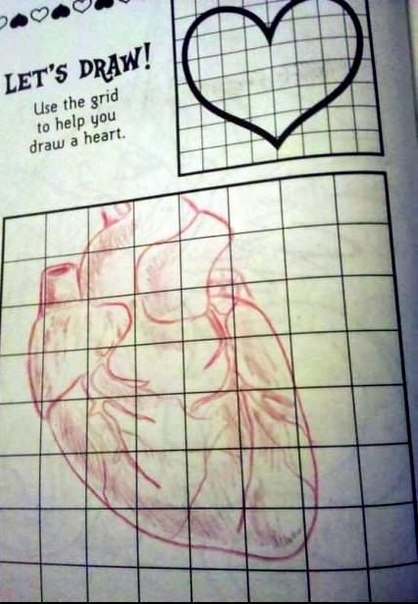Сердце — орган чувств и познания, а не только мотор кровообращения
Нам приходится в повседневной жизни слышать о том, что сердце «страдает», «болит» и т. д. В художественной литературе, в беллетристике можно найти выражения: «сердце тоскует», «радуется», «чувствует» и т. д.
Сердце все оплетено сетью волокон симпатической нервной системы и через нее теснейшим образом связано с головным и спинным мозгом. И что особенно важно для нас, этим нервным узлам и волокнам несомненно принадлежит очень важная роль в физиологии чувствительности.
Таким образом, наши анатомо-физиологические знания о сердце не только не мешают, а скорее даже побуждают нас считать сердце важнейшим органом чувств, и притом чрезвычайно тонким и универсальным, указывающим наше субъективное состояние и всегда его изобличающим, а не только центральным мотором кровообращения.
Но Священное Писание говорит нам о сердце гораздо больше:
· Сердцу придается значение не только центрального органа чувств, но и важнейшего органа познания, органа мысли и восприятия духовных воздействий. И больше того: сердце по Священному Писанию есть орган общения человека с Богом, а следовательно, оно есть орган высшего познания.
· Сердцем осуществляются высшие функции духа человеческого — вера в Бога и любовь к Нему: Возлюби Господа Бога твоего всем сердцем твоим (Мф. 22:37), Господа Бога святите в сердцах ваших (1 Пет. 3:15).
· Сердцем мы молимся, и одна из великих форм молитвы есть безмолвный вопль к Богу. Сердце их вопиет к Богу, — говорит пророк Иеремия (Плач. 2:18).
· Сердце есть хранилище добра и зла: от избытка сердца говорят уста; добрый человек из доброго сокровища выносит доброе, а злой человек из злого сокровища выносит злое (Мф. 12:34-35).
· В сердце — седалище совести нашей, этого ангела-хранителя. Если сердце наше осуждает нас... (1 Ин. 3:20).
Сердце — второй орган мышления и интуиции
Именно желаниями и стремлениями сердца определяется все поведение человека, выбор жизненного пути. А чувствами и желаниями определяется и направление пути мышления. Но сердце не только определяет наше мышление; как это ни странно покажется всем, считающим непреложным учение психологии об уме как органе мышления и познания, — именно сердце, по Священному Писанию, мыслит, размышляет, познает: Для чего вы мыслите худое в сердцах ваших? (Мф.9:4). Слово Божие... судит помышления и намерения сердечные (Евр. 4:12).
То, что впоследствии Бергсон окончательно назвал интуицией, Паскаль назвал чувством тонкостей, чутьем суждения, чувством, вдохновением, сердцем, инстинктом. Его вывод таков: «Надо, следовательно, возложить наше упование на “чувство”, иначе упование наше постоянно будет шататься».
Головной мозг — это «телефонная станция»
Удивительные и совершенно новые суждения о мозге — кумире интеллектуалистов — высказал Бергсон. Он полагает, что разница между спинным мозгом, рефлекторно реагирующим на получаемые импульсы, и головным мозгом — только в сложности, а не в характере функций. В головном мозгу только регистрируется восприятие, пришедшее извне, и выбирается подходящий способ ответной реакции.
Наш гениальный физиолог Иван Петрович Павлов исследовал физиологическое значение лобных долей полушарий мозга. Эти доли доселе считались важнейшей частью головного мозга, центрами высшей психической деятельности, органом мышления по преимуществу, даже седалищем души. Но Павлов не нашел в них никаких особенно важных приборов, которые устанавливали бы высшее совершенство нервной деятельности.
Это то же самое, что говорил Бергсон: «Мозг не что иное как нечто вроде центральной телефонной станции: его роль сводится к выдаче сообщения или к выяснению его. Он ничего не прибавит к тому, что получил».
А если мозг нельзя считать органом чувства, то это в огромной мере подтверждает учение Священного Писания о сердце как органе чувств вообще, и в особенности высших чувств.
Святитель Лука (Крымский)
Нам приходится в повседневной жизни слышать о том, что сердце «страдает», «болит» и т. д. В художественной литературе, в беллетристике можно найти выражения: «сердце тоскует», «радуется», «чувствует» и т. д.
Сердце все оплетено сетью волокон симпатической нервной системы и через нее теснейшим образом связано с головным и спинным мозгом. И что особенно важно для нас, этим нервным узлам и волокнам несомненно принадлежит очень важная роль в физиологии чувствительности.
Таким образом, наши анатомо-физиологические знания о сердце не только не мешают, а скорее даже побуждают нас считать сердце важнейшим органом чувств, и притом чрезвычайно тонким и универсальным, указывающим наше субъективное состояние и всегда его изобличающим, а не только центральным мотором кровообращения.
Но Священное Писание говорит нам о сердце гораздо больше:
· Сердцу придается значение не только центрального органа чувств, но и важнейшего органа познания, органа мысли и восприятия духовных воздействий. И больше того: сердце по Священному Писанию есть орган общения человека с Богом, а следовательно, оно есть орган высшего познания.
· Сердцем осуществляются высшие функции духа человеческого — вера в Бога и любовь к Нему: Возлюби Господа Бога твоего всем сердцем твоим (Мф. 22:37), Господа Бога святите в сердцах ваших (1 Пет. 3:15).
· Сердцем мы молимся, и одна из великих форм молитвы есть безмолвный вопль к Богу. Сердце их вопиет к Богу, — говорит пророк Иеремия (Плач. 2:18).
· Сердце есть хранилище добра и зла: от избытка сердца говорят уста; добрый человек из доброго сокровища выносит доброе, а злой человек из злого сокровища выносит злое (Мф. 12:34-35).
· В сердце — седалище совести нашей, этого ангела-хранителя. Если сердце наше осуждает нас... (1 Ин. 3:20).
Сердце — второй орган мышления и интуиции
Именно желаниями и стремлениями сердца определяется все поведение человека, выбор жизненного пути. А чувствами и желаниями определяется и направление пути мышления. Но сердце не только определяет наше мышление; как это ни странно покажется всем, считающим непреложным учение психологии об уме как органе мышления и познания, — именно сердце, по Священному Писанию, мыслит, размышляет, познает: Для чего вы мыслите худое в сердцах ваших? (Мф.9:4). Слово Божие... судит помышления и намерения сердечные (Евр. 4:12).
То, что впоследствии Бергсон окончательно назвал интуицией, Паскаль назвал чувством тонкостей, чутьем суждения, чувством, вдохновением, сердцем, инстинктом. Его вывод таков: «Надо, следовательно, возложить наше упование на “чувство”, иначе упование наше постоянно будет шататься».
Головной мозг — это «телефонная станция»
Удивительные и совершенно новые суждения о мозге — кумире интеллектуалистов — высказал Бергсон. Он полагает, что разница между спинным мозгом, рефлекторно реагирующим на получаемые импульсы, и головным мозгом — только в сложности, а не в характере функций. В головном мозгу только регистрируется восприятие, пришедшее извне, и выбирается подходящий способ ответной реакции.
Наш гениальный физиолог Иван Петрович Павлов исследовал физиологическое значение лобных долей полушарий мозга. Эти доли доселе считались важнейшей частью головного мозга, центрами высшей психической деятельности, органом мышления по преимуществу, даже седалищем души. Но Павлов не нашел в них никаких особенно важных приборов, которые устанавливали бы высшее совершенство нервной деятельности.
Это то же самое, что говорил Бергсон: «Мозг не что иное как нечто вроде центральной телефонной станции: его роль сводится к выдаче сообщения или к выяснению его. Он ничего не прибавит к тому, что получил».
А если мозг нельзя считать органом чувства, то это в огромной мере подтверждает учение Священного Писания о сердце как органе чувств вообще, и в особенности высших чувств.
Святитель Лука (Крымский)
The heart is an organ of senses and cognition, and not just a motor of blood circulation
In everyday life we have to hear that the heart “suffers”, “hurts”, etc. In fiction and fiction, one can find expressions: “the heart is yearning,” “rejoices,” “feels,” etc.
The heart is all intertwined with a network of fibers of the sympathetic nervous system and through it is intimately connected with the brain and spinal cord. And what is especially important for us, these nerve nodes and fibers undoubtedly have a very important role in the physiology of sensitivity.
Thus, our anatomical and physiological knowledge of the heart not only does not interfere, but rather even encourages us to consider the heart as the most important sensory organ, moreover, it is extremely thin and universal, indicating our subjective state and always revealing it, and not just the central motor of blood circulation.
But scripture tells us more about the heart:
· The heart is given importance not only of the central organ of senses, but also of the most important organ of cognition, the organ of thought and perception of spiritual influences. And more than that: the heart according to the Holy Scriptures is the organ of human communication with God, and therefore, it is the organ of higher knowledge.
· The highest functions of the human spirit are carried out by the heart - faith in God and love for Him: Love the Lord your God with all your heart (Matthew 22:37), bless the Lord God in your hearts (1 Pet. 3:15).
· We pray with our hearts, and one of the great forms of prayer is a silent cry to God. Their heart cries out to God, says the prophet Jeremiah (Lamentation 2:18).
· The heart is the storehouse of good and evil: from the excess of the heart, the mouth speaks; a good person brings good from a good treasure, and an evil person brings evil out of an evil treasure (Matt. 12: 34-35).
· In the heart is the seat of our conscience, this guardian angel. If our heart condemns us ... (1 John 3:20).
The heart is the second organ of thought and intuition
It is the desires and aspirations of the heart that determine all human behavior, the choice of a life path. And feelings and desires determine the direction of the path of thinking. But the heart not only determines our thinking; strangely enough, it will seem to everyone who considers the teaching of psychology about the mind as an organ of thinking and cognition to be immutable - it is the heart, according to the Holy Scriptures, that thinks, ponders, knows: Why do you think the worst in your hearts? (Matthew 9: 4). The Word of God ... judges the thoughts and intentions of the heart (Heb. 4:12).
What Bergson subsequently finally called intuition, Pascal called a sense of subtleties, a sense of judgment, a feeling, inspiration, heart, instinct. His conclusion is: "Therefore, we must put our hope in" feeling ", otherwise our hope will constantly stagger."
The brain is a “telephone exchange”
Amazing and completely new judgments about the brain - the idol of the intellectuals - expressed Bergson. He believes that the difference between the spinal cord, which reacts reflexively to the received impulses, and the brain, is only in complexity, and not in the nature of the functions. In the brain, only the perception that comes from the outside is registered, and the appropriate response method is selected.
Our brilliant physiologist Ivan Petrovich Pavlov investigated the physiological significance of the frontal lobes of the cerebral hemispheres. Until now, these lobes were considered to be the most important part of the brain, centers of higher mental activity, the organ of thinking primarily, even the seat of the soul. But Pavlov did not find in them any particularly important devices that would establish the highest perfection of nervous activity.
This is the same as Bergson said: “The brain is nothing more than a central telephone exchange: its role is to issue a message or to clear it up. He will not add anything to what he received. ”
And if the brain cannot be considered an organ of feeling, then this greatly confirms the teaching of the Holy Scriptures about the heart as an organ of feelings in general, and especially of higher senses.
Saint Luke (Crimean)
In everyday life we have to hear that the heart “suffers”, “hurts”, etc. In fiction and fiction, one can find expressions: “the heart is yearning,” “rejoices,” “feels,” etc.
The heart is all intertwined with a network of fibers of the sympathetic nervous system and through it is intimately connected with the brain and spinal cord. And what is especially important for us, these nerve nodes and fibers undoubtedly have a very important role in the physiology of sensitivity.
Thus, our anatomical and physiological knowledge of the heart not only does not interfere, but rather even encourages us to consider the heart as the most important sensory organ, moreover, it is extremely thin and universal, indicating our subjective state and always revealing it, and not just the central motor of blood circulation.
But scripture tells us more about the heart:
· The heart is given importance not only of the central organ of senses, but also of the most important organ of cognition, the organ of thought and perception of spiritual influences. And more than that: the heart according to the Holy Scriptures is the organ of human communication with God, and therefore, it is the organ of higher knowledge.
· The highest functions of the human spirit are carried out by the heart - faith in God and love for Him: Love the Lord your God with all your heart (Matthew 22:37), bless the Lord God in your hearts (1 Pet. 3:15).
· We pray with our hearts, and one of the great forms of prayer is a silent cry to God. Their heart cries out to God, says the prophet Jeremiah (Lamentation 2:18).
· The heart is the storehouse of good and evil: from the excess of the heart, the mouth speaks; a good person brings good from a good treasure, and an evil person brings evil out of an evil treasure (Matt. 12: 34-35).
· In the heart is the seat of our conscience, this guardian angel. If our heart condemns us ... (1 John 3:20).
The heart is the second organ of thought and intuition
It is the desires and aspirations of the heart that determine all human behavior, the choice of a life path. And feelings and desires determine the direction of the path of thinking. But the heart not only determines our thinking; strangely enough, it will seem to everyone who considers the teaching of psychology about the mind as an organ of thinking and cognition to be immutable - it is the heart, according to the Holy Scriptures, that thinks, ponders, knows: Why do you think the worst in your hearts? (Matthew 9: 4). The Word of God ... judges the thoughts and intentions of the heart (Heb. 4:12).
What Bergson subsequently finally called intuition, Pascal called a sense of subtleties, a sense of judgment, a feeling, inspiration, heart, instinct. His conclusion is: "Therefore, we must put our hope in" feeling ", otherwise our hope will constantly stagger."
The brain is a “telephone exchange”
Amazing and completely new judgments about the brain - the idol of the intellectuals - expressed Bergson. He believes that the difference between the spinal cord, which reacts reflexively to the received impulses, and the brain, is only in complexity, and not in the nature of the functions. In the brain, only the perception that comes from the outside is registered, and the appropriate response method is selected.
Our brilliant physiologist Ivan Petrovich Pavlov investigated the physiological significance of the frontal lobes of the cerebral hemispheres. Until now, these lobes were considered to be the most important part of the brain, centers of higher mental activity, the organ of thinking primarily, even the seat of the soul. But Pavlov did not find in them any particularly important devices that would establish the highest perfection of nervous activity.
This is the same as Bergson said: “The brain is nothing more than a central telephone exchange: its role is to issue a message or to clear it up. He will not add anything to what he received. ”
And if the brain cannot be considered an organ of feeling, then this greatly confirms the teaching of the Holy Scriptures about the heart as an organ of feelings in general, and especially of higher senses.
Saint Luke (Crimean)

У записи 3 лайков,
0 репостов,
198 просмотров.
0 репостов,
198 просмотров.
Эту запись оставил(а) на своей стене Вероника Вовденко
























